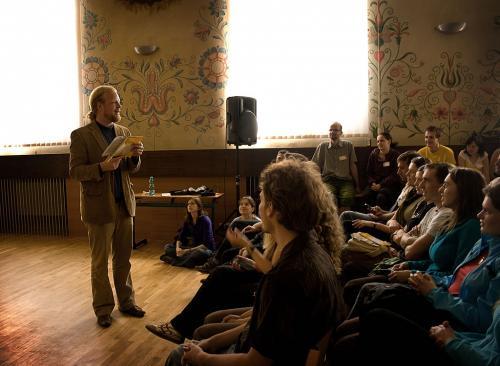At this year’s meeting of the World Economic Forum in Davos the only Czech who had a chance to speak was the young economist Tomáš Sedláček. His book, whose title literally translates as “The Economy of Good and Evil” has seen good sales in the Czech Republic, but it probably wasn’t read very much, because otherwise, we wouldn’t still be seeing only economists commenting publicly on the economic crisis today.Leaving the main point of the book aside, what is more interesting in the context of the “crisis” is actually a (side) effect of the work.
The author tells us a well-known fact: today, both the present and the past are interpreted for the media by economists, and the more audacious of them even try to predict the future. It has become the status quo, no doubt about it. Recently influential interpreters of the world – sociologists, psychiatrists and political scientist – have adopted values, arguments and jargon from the world of economics. The interpreters of yore – theologists, banished to the church yards, took the subject from the philosophers even with the name.It looked as if the highest level of science’s development was its economization. Given this, Sedláček could have explored the development of science and man from the perspective and using the tools of today’s science of economics, risk-free. That’s probably where the author began, but it didn’t seem right, so, going against the expectations of his progressive colleagues, he looked to old authors, even to mythology.He tames the arrogance of a modern scientist, who feels like he is at the top of the mountain, and in the end decided to explore old theories about the world and present them as the sources of today’s usual solutions and systems. The result could have been a longed-for history of thought through the prism of modern economics, but it didn’t materialize. Sedláček even abandoned the thought that we know everything better then ancient thinkers. Instead of a story of evolution, we get a tale of degeneration.It doesn’t seem that Sedláček is convinced of everything he claims. Maybe he does commit simplification in his typology of Christian, Judaism and elsewhere, he may even be wrong at times. He is neither a theologist or a historian, but you cannot fault his intuition/but you have to admire his intuition. Having explored his native subject and its authority in the context of theology and philosophy, he came to the conclusion, that most economics theories do not come form the old world. Actually in his description, maybe not knowingly, he reveals something potentially very unpleasant. That today’s interpreters of the world – economists and businessmen – have rather shabby education in the subject that they scorn most, that is philosophy. What does it mean when their accepted formulas, rules and world views are actually very simplified opinions of second-rate eggheads, who cannot accept being compared to the work of thinkers of the past, or the judgment of common sense?A grocer can run a bank and even a country, but he will still do it the same way as with a store. Once he reaches high society, he has to mask his roughness, at least on the outside. But how can he know what’s going on in the world, where to stand and what to let go of? Can he give others advice about anything besides where what is in the store?Every morning we receive a some information from the media that, if one thinks about it, isn’t information at all. The economic analysts quoted in these so-called news pieces try to guess how the divine markets will “act”, what they may “like” today, and what they will “believe”. Their forecasts doubtlessly (although I don’t know how) influence these worshiped “markets”, that we subsequently believe something, like something or not. Next day we can only hypothesize about why it happened, but we never know for sure – we can’t ask the markets. All religious ideology and obscurantism of the past pales in comparison to this self-importance without memory.—
Tomáš Sedláček’s book was translated into English and was published last year by Oxford University Press as The Economy of Good and Evil: The Quest for Economic Meaning from Gilgamesh to Wall Street.
published: 16. 6. 2013







